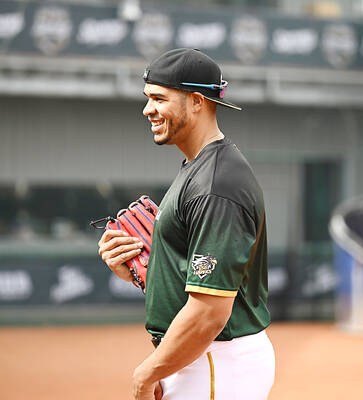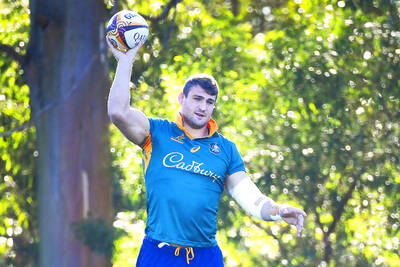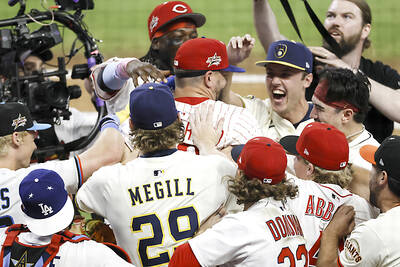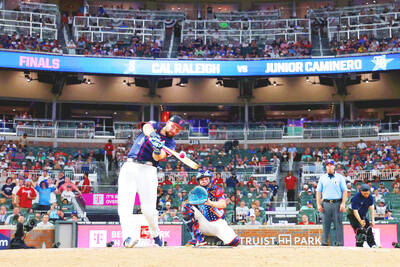For a competition built on speed, power, aggressiveness and the not-so-occasional brawl, the National Hockey League has stayed curiously aloof from the world of drug testing.
The time has come for change.
As the NHL and its ice hockey players association skirmish over economic issues in collective bargaining, trying to avoid a lockout that could curtail or cancel next season, the doping issue should not be an afterthought or a bargaining chip as it was in major league baseball.
The NHL does not test for steroids, stimulants or any other performance-enhancing drugs. Players can juice up throughout the season without risk of penalties. All the league does is offer education and counseling.
Of the four major leagues in the US, the NFL has the strongest anti-doping program and the NHL the most lame, with the NBA and major league baseball in between.
The attitude in the NHL is that there is no need to do much more than the little it has for the past decade, even in the face of steroid abuse throughout the sporting landscape.
"We are fortunate not to have a problem with steroid use in our sport," said Ted Saskin, senior director of the NHL Players Association.
Bill Daly, the NHL's chief legal officer and executive vice president, offers a similar appraisal.
"It's certainly the opinion of our program doctors that we do not have an issue with steroid use in our sport," Daly said.
As evidence, Saskin and Daly point to the fact that none of the NHL players who participated in the Nagano and Salt Lake City Olympics ever tested positive for steroids.
That kind of thinking smacks of the head-in-the-sand syndrome that afflicted baseball until tests last year showed that dozens of players had used steroids.
Without random year-round tests, the NHL has no way of knowing what its players are doing between Olympics.
"The NHL absolutely, unequivocally needs a bona fide anti-doping program," said steroids expert and World Anti-Doping Agency consultant Dr. Gary Wadler. "I have a hard time believing that hockey is so unique it is virtually the only sport in the world that wouldn't have a drug issue."
An array of stimulants and anabolic steroids would be attractive to hockey players, Wadler says.
"I'm not aware of a single sport where one drug or another may not have some advantage," he said. "To suggest that the NHL is immune to problems of performance-enhancing drug abuse borders on the absurd."
No one is saying that the NHL has a steroid problem. And without testing, no one can say it doesn't.
"I shouldn't guess that, the fans shouldn't guess that, nobody should guess that," Wadler said. "It's not a matter for people to speculate. It's what we need to know."
The league ought to look into whether stimulants or steroids are feeding into the fighting in games. Did they play any role in Todd Bertuzzi's vicious attack recently that sent Colorado's Steve Moore to the hospital with a broken neck, concussion and other injuries? That wasn't the first time Bertuzzi attacked a player.
"There's no question when there's physicality and very aggressive behavior in sport, you have to at least have the question go through your mind about anabolic steroids," Wadler says. "Because clearly one of the things that anabolic steroids do is make you more aggressive."
If 'roid rage and hair-trigger tempers intensified by stimulants are contributing to the fighting, the NHL wouldn't have a clue without testing.
Daly says the league has had preliminary talks with the players association about testing and will discuss it as part of the negotiations for a new contract to replace the one that expires on Sept. 15.
"I'm very confident we don't have a problem with performance-enhancing drugs in our sport," Daly said. "Having said that, I also see the benefit of having a more comprehensive program that may include elements of testing and sanctions."
Saskin, like baseball union leader Donald Fehr and unlike NFL union chief Gene Upshaw, sounded less enthusiastic about testing.
"We expect to continue our current program in the future, and will continue to adapt the program to address any developing situations that may arise," he said.
That's pretty much an outline for doing nothing, even if the health of the players and the integrity of the game are at risk.
Baseball went that route and found itself in a mess when 5-7 percent of its initial tests came back positive and star players were linked in a federal investigation to a San Francisco lab that allegedly distributed steroids.
The World Anti-Doping Agency already has the list of drugs, the labs, the out-of-competition testing, the education programs and the adjudication process that hockey players have participated in for the Olympics.

Tainan TSG Hawks slugger Steven Moya, who is leading the CPBL in home runs, has withdrawn from this weekend’s All-Star Game after the unexpected death of his wife. Moya’s wife began feeling severely unwell aboard a plane that landed at Taiwan Taoyuan International Airport on Friday evening. She was rushed to a hospital, but passed away, the Hawks said in a statement yesterday. The franchise is assisting Moya with funeral arrangements and hopes fans who were looking forward to seeing him at the All-Star Game can understand his decision to withdraw. According to Landseed Medical Clinic, whose staff attempted to save Moya’s wife,

Wallabies coach Joe Schmidt yesterday backed Nick Champion de Crespigny to be the team’s “roving scavenger” after handing him a shock debut in the opening Test against the British and Irish Lions Test in Brisbane. Hard man Champion de Crespigny, who spent three seasons at French side Castres before moving to the Western Force this year, is to get his chance tomorrow with first-choice blindside flanker Rob Valetini not fully fit. His elevation is an eye-opener, preferred to Tom Hooper, but Schmidt said he had no doubt about his abilities. “I keep an eye on the Top 14 having coached there many years

ON A KNEE: In the MLB’s equivalent of soccer’s penalty-kicks shoot-out, the game was decided by three batters from each side taking three swings each off coaches Kyle Schwarber was nervous. He had played in Game 7 of the MLB World Series and homered for the US in the World Baseball Classic (WBC), but he had never walked up to the plate in an All-Star Game swing-off. No one had. “That’s kind of like the baseball version of a shoot-out,” Schwarber said after homering on all three of his swings, going down to his left knee on the final one, to overcome a two-homer deficit. That held up when Jonathan Aranda fell short on the American League’s final three swings, giving the National League a 4-3 swing-off win after

Seattle’s Cal Raleigh defeated Tampa Bay’s Junior Caminero 18-15 in Monday’s final to become the first catcher to win the Major League Baseball Home Run Derby. The 28-year-old switch-hitter, who leads MLB with 38 homers this season, won US$1 million by capturing the special event for sluggers at Atlanta’s Truist Park ahead of yesterday’s MLB All-Star Game. “It means the world,” Raleigh said. “I could have hit zero home runs and had just as much fun. I just can’t believe I won. It’s unbelievable.” Raleigh, who advanced from the first round by less than 25mm on a longest homer tiebreaker, had his father